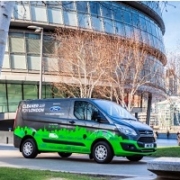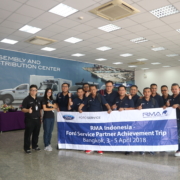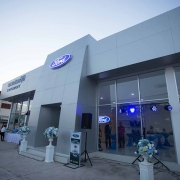Ford Hits CO2 Manufacturing Emissions Reduction Target Eight Years Early
November 8th, Bangkok Thailand -Ford Motor Company recently announced as part of its 19th annual Sustainability Report it has met its goal to reduce manufacturing emissions – eight years ahead of schedule.
In 2010, Ford’s Environmental Quality Office announced a goal – to reduce the company’s carbon dioxide emissions from manufacturing operations by 30 percent per vehicle produced by 2025.
Ford hit the target twice as fast as expected. The results are dramatic, with a global manufacturing CO2 emissions reduction of more than 3.4 metric tons from 2010 to 2017 – equivalent to greenhouse gas emissions from more than 728,000 passenger vehicles driven for one year.
œWe are proud of the work our Asia Pacific markets have done to help achieve this goal, said Cynthia Williams, director, sustainability, environment and safety engineering, Asia Pacific. œWe’ve made several improvements to our manufacturing operations throughout the region – from the lighting we use to innovative technologies – all of which played an important role in dramatically reducing our CO2 footprint.
Ford reduced its emissions footprint through energy conservation and efficiency changes at Ford’s manufacturing facilities. For example, in 2017, Ford Thailand Manufacturing installed more than 1,000 LED lights, reducing facility energy use by 630,000 kWh a year, with a goal to replace all traditional lighting on-site with efficient LED lighting over the next five years.
Painting operations also require a large amount of energy. Across Asia Pacific, the introduction of new technology in Ford’s paint shops is making a significant difference.
For example, in China, Changan Ford plants are running an abatement system to treat paint exhaust, two of them achieving best-in-class volatile organic compound (VOC) emissions in Ford. The Chennai assembly plant in India is installing oxider to control VOC emissions from paint shop oven exhausts. And in Thailand, an innovative paint programming system was developed that can reduce solvent use per vehicle by 70 percent.
Ford also remains focused on reducing vehicle emissions by doing its share to deliver on CO2 reductions consistent with the Paris Climate Accord. The company is charting its course for the future by investing $11 billion to put 40 hybrid and fully electric vehicle models on the road by 2022.
Sustainability Report Asia Pacific Highlights
The 2017-2018 Ford Sustainability Report highlights the automaker’s ongoing work to drive responsible business practices in Asia Pacific, including:
Mobility Solutions
Through several strategic partnerships, Ford is developing smarter vehicles for smarter cities, focusing on autonomous, electrified and connected vehicles to address the mobility needs of the future. Across the region, Ford is introducing Ford Co-Pilot360TM, a suite of advanced driver-assist technologies. The all-new Ford Focus will be the first vehicle in Asia Pacific to get the new features, which will be incorporated into many new vehicles sold in the region.
Electrification
Under Ford’s ambitious electrification plan for China, the Ford Mondeo Energi plug-in hybrid was launched in March 2018. And by 2025, Ford will launch at least 15 new electrified vehicles from Ford and Lincoln. In addition, Ford and Zotye Auto agreed in November 2017 to establish Zotye Ford Automobile Co., a new joint venture that will build a range of all-electric vehicles for Chinese consumers, pending regulatory approval. And in India, Ford extended its partnership with the Mahindra Group to co-develop a small electric vehicle.
Water Stewardship
In 2017, facilities in Asia Pacific used 17 percent less water per vehicle produced compared to 2015. In China, for example, Changan Ford’s plants reused 300,000 cubic meters of wastewater during 2017. And the Chennai vehicle assembly and engine plant in India is a zero-wastewater discharge plant, with 100 percent being reused in manufacturing processes.
Zero Waste to Landfill
In 2017, 14 manufacturing plants in the region maintained their zero waste to landfill status through waste segregation, recycling and reusing, and by increasing the use of eco-friendly packaging.
Ford’s Contribution to Society
Ford’s Operation Better World program provides assistance to local communities and encourages employees to devote time to volunteering. Across the region, thousands of volunteers participated in Ford’s Global Caring Month, with 803 employees contributing 2,551 hours across 24 activities in China, and over 300 Ford of Australia employees donating around 2,400 service hours.
About Ford Motor Company
Ford Motor Company is a global company based in Dearborn, Michigan. The company designs, manufactures, markets and services a full line of Ford cars, trucks, SUVs, electrified vehicles and Lincoln luxury vehicles, provides financial services through Ford Motor Credit Company and is pursuing leadership positions in electrification, autonomous vehicles and mobility solutions. Ford employs approximately 201,000 people worldwide. For more information regarding Ford, its products and Ford Motor Credit Company, please visit www.corporate.ford.com.












